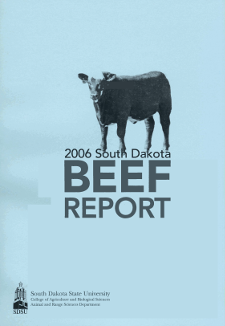Document Type
Report
Report Number
2006-10
Publication Date
2006
Keywords
forage production, stocking rate, beef production, south dakota, management intensive grazing (mig)
Summary
In the summer of 1999, the Hand and Hyde County Bootstraps group met to form a working group to better understand “Management Intensive” Grazing (MIG) systems. From this working group of ranchers and state and federal agency personnel, evolved a goal to establish six demonstration sites in South Dakota (Figure 1). In 2000, the first demonstration site was established by Jim Faulstich near Highmore, SD in Hyde County. This site is a 320 acre pasture dominated by native mixed-grass prairie vegetation with some introduced species such as smooth bromegrass, Kentucky bluegrass, and crested wheatgrass. The pasture was fenced into 21 paddocks and water was developed using aboveground pipeline. Cattle weights, forage biomass, forage utilization, and climate data were measured. This report summarizes the first six years of the study and provides some predictive tools for forage production, stocking rate, and beef production based on climate data.
Number of Pages
4
Format
application/pdf
Language
en
Publisher
South Dakota State University
Rights
Copyright © 2006 South Dakota State University
Recommended Citation
Smart, Alexander J. and Mousel, Eric, "Predicting Forage Production, Stocking Rate, and Beef Production in Eastern South Dakota: A Case Study" (2006). South Dakota Beef Report, 2006. 11.
https://openprairie.sdstate.edu/sd_beefreport_2006/11


